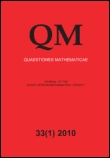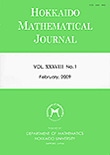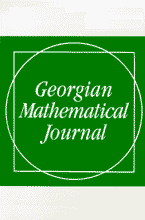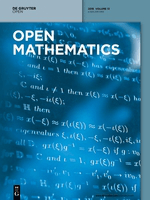
Dissertationes Mathematicae
Scope & Guideline
Unlocking the Potential of Mathematical Research.
Introduction
Aims and Scopes
- Advanced Functional Analysis:
The journal frequently publishes papers that delve into functional analysis, exploring concepts such as Banach spaces, operator theory, and semigroups, which are fundamental in understanding various mathematical structures. - Stochastic Processes and Differential Equations:
A significant portion of the research focuses on stochastic processes and differential equations, particularly in relation to boundary conditions and parabolic equations, highlighting the interplay between stochastic analysis and partial differential equations. - Algebraic Structures and Group Theory:
The journal emphasizes research on algebraic structures, including group theory and its applications, showcasing papers that address topics such as graph products of groups and homomorphisms. - Geometric and Topological Analysis:
Papers often explore geometric and topological aspects of mathematics, including studies on homotopical properties and the topology of function spaces, indicating a robust interest in the geometry of mathematical objects. - Harmonic Analysis and Operator Theory:
Research on harmonic analysis, particularly in relation to graphs and operator theory, is a notable focus, reflecting the journal's commitment to addressing complex analytical techniques and their applications.
Trending and Emerging
- Interdisciplinary Applications of Mathematics:
There is a notable trend towards applying mathematical theories to interdisciplinary fields, such as quantum hypergraph homomorphisms and their implications in non-local games, indicating an increasing interest in the interaction between mathematics and other scientific domains. - Nonlocal Operators and Stochastic Processes:
Recent papers have increasingly addressed nonlocal operators and their applications in stochastic processes, showcasing a growing interest in advanced mathematical tools that extend traditional local analysis. - Advanced Operator Theory:
The exploration of sophisticated operator theories, including CP-semigroups and dilations, reflects a trend towards deeper investigations into the structure and behavior of operators in various mathematical contexts. - Topological Dynamics and Colorings:
The rise of research on topological dynamics, particularly continuous colorings, signifies a growing interest in the interplay between topology and dynamics, suggesting an expanding frontier in mathematical exploration.
Declining or Waning
- Classical Limit Theorems:
While limit theorems have traditionally been a staple in probability theory, recent publications indicate a waning interest in classical and almost sure local limit theorems, suggesting a potential shift towards more complex probabilistic frameworks. - Basic Theoretical Constructs:
The foundational aspects of mathematical theories, such as basic theory in generalized functions, seem to be receiving less attention, perhaps as researchers focus on more applied or advanced theoretical constructs. - Discrete Systems and Symplectic Geometry:
Research on discrete symplectic systems and related topics has decreased, indicating a potential shift in focus towards continuous systems or other areas of applied mathematics. - Elementary Algebraic Concepts:
There seems to be a decline in papers focused solely on elementary algebraic concepts, as the journal increasingly gravitates towards more sophisticated algebraic structures and their applications.
Similar Journals

Glasnik Matematicki
Innovative Insights into the World of MathematicsGlasnik Matematicki is a prestigious academic journal published by the Croatian Mathematical Society, focusing on a broad spectrum of topics within the field of mathematics. Established in Croatia, this journal has gained recognition for its contributions to the mathematical community, providing a platform for researchers and scholars to share their groundbreaking findings and innovative theories. The journal operates without an open access model, encouraging traditional subscription-based readership, which enhances its standing among journals in the field. With a respectable impact factor and categorized in the Q3 quartile for mathematics (miscellaneous) as of 2023, Glasnik Matematicki is vital for those engaged in advanced mathematical research and education. It aims to disseminate significant mathematical advancements and facilitate scholarly exchange, making it an essential resource for students, professionals, and researchers alike. The journal’s convergence period from 2006 to 2024 marks its ongoing commitment to academic excellence and its relevance in contemporary mathematical discourse.

Matematicki Vesnik
Fostering excellence in mathematical inquiry since 1993.Matematicki Vesnik is a distinguished open-access journal published by the MATH SOC SERBIA-DRUSTVO MATEMATICARA SRBIJE, dedicated to advancing the field of mathematics since its inception. With an ISSN of 0025-5165 and an E-ISSN of 2406-0682, this journal has been a significant platform for disseminating research findings since its establishment in 1993. Hosted in Serbia, it embraces a broad scope of mathematical discourse while achieving a Q3 category ranking in miscellaneous mathematics for 2023. As part of its commitment to fostering scholarly communication, Matematicki Vesnik is accessible to a global audience, promoting high-quality research and innovative ideas within the mathematical community. With converged years from 1999 to 2024 and a Scopus rank of #232 out of 399 in General Mathematics, the journal plays a crucial role in enhancing visibility and impact for researchers, professionals, and students alike in the dynamic landscape of mathematical inquiry.

Quaestiones Mathematicae
Elevating Mathematical Research to New HeightsQuaestiones Mathematicae is a distinguished academic journal dedicated to the field of mathematics, published by Taylor & Francis Ltd, a renowned name in scholarly publishing. Established in 1976, this journal has been a critical resource for researchers, professionals, and students alike, providing a platform for innovative and rigorous advancements in miscellaneous mathematics. The journal holds a 2023 Scopus rank of 35 out of 90 in its category, reflecting its significant contribution to the field with a 61st percentile standing, and whilst it is categorized in the Q3 quartile, it remains an essential avenue for sharing pivotal mathematical research. Although not open access, Quaestiones Mathematicae offers a rich archive of acclaimed papers, encouraging scholarly dialogue and fostering the growth of mathematical knowledge. With a converged span extending to 2024, it continues to evolve and adapt, ensuring its relevance and impact within the global academic community.

Rendiconti del Circolo Matematico di Palermo
Cultivating Mathematical Excellence Since 1887.Rendiconti del Circolo Matematico di Palermo, published by SPRINGER-VERLAG ITALIA SRL, is a revered journal in the field of mathematics, emphasizing the cultivation and dissemination of mathematical knowledge since its inception in 1887. With its ISSN 0009-725X and E-ISSN 1973-4409, this esteemed publication has continued to thrive, showcasing innovative research, comprehensive reviews, and thoughtful discussions from diverse areas in mathematics, particularly in its Q2 ranking within the miscellaneous mathematics category. Its historical significance is underscored by its convergence of publications across numerous years, including its notable periods from 1887 to 1916, 1919 to 1938, and beyond, effectively capturing the evolution of mathematical thought. Though not open access, the journal remains an essential resource for researchers, professionals, and students aiming to stay updated with the latest advancements and methodologies in the ever-evolving landscape of mathematics. With its Scopus rank placing it in the top 25th percentile, Rendiconti del Circolo Matematico di Palermo continues to be a cornerstone for scholarly dialogue and development in its domain.

Analele Stiintifice ale Universitatii Ovidius Constanta-Seria Matematica
Navigating the Future of Mathematics with Rigorous ScholarshipAnalele Stiintifice ale Universitatii Ovidius Constanta-Seria Matematica is a prominent open-access journal established by OVIDIUS UNIV PRESS in Romania, dedicated to advancing the fields of mathematics, specifically in Analysis and Applied Mathematics. Since its inception, the journal has emphasized the dissemination of high-quality research, making it accessible to a global audience. With an ISSN of 1224-1784 and E-ISSN 1844-0835, it has positioned itself within the academic community, achieving a respectable Q3 ranking in both analysis and applied mathematics in 2023, reflecting its commitment to rigorous scholarship. The journal spans a considerable publication window from 2009 to 2024, catering to the ongoing developments in mathematical sciences and their applications. Researchers, professionals, and students alike will find valuable insights and contributions that enrich their understanding and foster collaboration within the mathematical community. The journal's headquarters is based at the Faculty of Mathematics & Computer Science, Bulevardul Mamaia 124, Constanta, Romania.

JOURNAL OF THE EUROPEAN MATHEMATICAL SOCIETY
Exploring the Depths of Mathematical InnovationThe JOURNAL OF THE EUROPEAN MATHEMATICAL SOCIETY, published by the EUROPEAN MATHEMATICAL SOCIETY (EMS), stands as a premier platform in the field of mathematics, known for its rigorous editorial standards and impactful contributions to both applied and theoretical aspects of the discipline. With a commendable Q1 ranking in both Applied Mathematics and Miscellaneous Mathematics categories, alongside a Scopus rank of 32 out of 399 in General Mathematics, this journal has established itself as a crucial resource for researchers and professionals. Since achieving Open Access status in 2021, it has expanded its reach, making cutting-edge research more accessible to a global audience. With a publication horizon extending from 2002 to 2024 and a dedicated focus on high-quality mathematical scholarship, the journal continues to foster innovation and collaboration within the mathematical community.

Hokkaido Mathematical Journal
Elevating mathematical discourse with every publication.Hokkaido Mathematical Journal, published by Hokkaido University, Department of Mathematics, stands as a pivotal platform for scholarly discourse in the field of mathematics. Established in 1972, this peer-reviewed journal has consistently contributed to the advancement of mathematical research, covering a wide spectrum of topics within the discipline. With its current ranking in the third quartile (Q3) among miscellaneous mathematics journals, it offers valuable insights and findings that cater to both established researchers and budding mathematicians alike. The journal is accessible through traditional subscription, fostering a community that values rigorous theoretical exploration and applied mathematical methods. As it approaches its convergence year in 2024, Hokkaido Mathematical Journal remains essential for those dedicated to pushing the boundaries of mathematical knowledge and innovation in Japan and beyond.

Georgian Mathematical Journal
Championing excellence in mathematical exploration.Georgian Mathematical Journal, published by Walter de Gruyter GmbH, is a prestigious academic journal dedicated to the field of mathematics, particularly in its multifaceted applications and theoretical explorations. With an ISSN of 1072-947X and an E-ISSN of 1572-9176, this journal is indexed within notable databases and holds a strong position as evidenced by its Q2 ranking in the Mathematics (miscellaneous) category as of 2023 and a ranking of #140 out of 399 in the general mathematics Scopus category, placing it in the 65th percentile for research visibility. Since its inception in 1994, the journal has continued to evolve, aiming to foster innovative research and scholarly communication among mathematicians worldwide. Although it does not offer Open Access, the journal’s commitment to quality and rigor ensures that published works are of high relevance, appealing to researchers, educators, and students who are dedicated to advancing mathematical knowledge across diverse domains.

Open Mathematics
Advancing Mathematical Frontiers, Open to AllOpen Mathematics, published by DE GRUYTER POLAND SP Z O O, is a prominent peer-reviewed journal that has been a vital platform for disseminating innovative research in the field of mathematics since its inception in 2015. With an impressive impact factor reflected by its Q2 ranking in the miscellaneous mathematics category and a commendable Scopus rank of #91 out of 399, it positions itself as a significant contributor to the mathematical community. This open access journal, headquartered in Poland, welcomes submissions that tackle diverse mathematical theories, applications, and methodologies, fostering knowledge exchange among researchers, professionals, and students globally. Since its launch, Open Mathematics has focused on bridging the gap between theoretical advancement and practical applications, making it an essential resource for anyone seeking to stay at the forefront of mathematical research and innovation. The journal offers easy online access, enhancing the visibility and impact of the valuable work published within its pages.

Pure and Applied Mathematics Quarterly
Advancing the Frontiers of Mathematical KnowledgePure and Applied Mathematics Quarterly is a prestigious journal published by INT PRESS BOSTON, INC, focusing on the diverse and evolving field of mathematics. Since its inception in 2007, this journal has grown significantly, currently holding a Q1 ranking in the Mathematics (Miscellaneous) category for 2023, positioning it among the leading publications in the discipline. With a commitment to publishing high-quality research, Pure and Applied Mathematics Quarterly fosters innovation and dialogue within the mathematical community by providing a platform for theoretical advancements and practical applications. The journal remains accessible to researchers and professionals through its ISSN 1558-8599 and E-ISSN 1558-8602, although it does not currently offer open access. As a vital resource for mathematicians, educators, and students, this journal endeavors to expand the frontiers of mathematical knowledge and contribute to the academic dialogue surrounding this fundamental science.